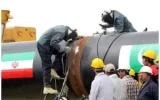Increasing pressure on Islamabad to complete the joint gas project with Iran

According to the exclusive report of Energy Press, the joint Iran-Pakistan gas project, which has been the subject of many speculations, has become one of the hot topics in the internal politics of Islamabad. Earlier, the Ministry of Petroleum of Pakistan issued a statement in early March 2023 that the completion of the joint gas project with the Islamic Republic of Iran will strengthen the energy security of Islamabad and announced that the Energy Committee in the Cabinet of Pakistan has planned to build an 81 km pipeline from the port of Gwadar to Pakistan’s common border with Iran has agreed.
Meanwhile, in recent days, the leader of the Jamaat-e-Islami Party of Pakistan, emphasizing the importance of the gas pipeline from the Islamic Republic of Iran to this country to meet the energy needs of Islamabad, demanded the completion of this joint project by the government of his country. In a press conference in Islamabad, Hafiz Naeemur Rahman severely criticized the performance of the government of this country in solving the long-term energy crisis and the people’s problems in paying the skyrocketing electricity costs. He stated: “People don’t have to bear the huge costs of electricity and gas because the government’s strategy to deal with deep energy problems is useless.” This Pakistani party leader emphasized: Benefiting from Iran’s energy source helps to provide 25% of our electricity and gas needs, so we demand the government of Pakistan not to delay the completion of this gas project.
The end of a long hiatus?
The construction of the peace pipeline was proposed in 1990 and it was decided that this pipeline would transfer Iranian gas to Pakistan and India, which would be a message of peace and friendship in the subcontinent. According to the initial agreement, this 2,700 km pipeline was supposed to transport Iran’s export gas from Pakistan to India.
It was predicted that in case of final agreement, 1100 km of this pipeline will be built in Iran, 1000 km in Pakistan and 600 km in India. According to the initial plan, 150 million cubic meters of Iranian gas was to be exported to India and Pakistan. Of this amount, 90 million cubic meters were intended for India and 60 million cubic meters for Pakistan, but this idea was not implemented.
In September 2012, the implementation of the treaty began and the then presidents of Iran and Pakistan agreed to cooperate in this field. Based on this cooperation, it was predicted that Pakistan would build its pipeline to the border of Iran within 22 months. Also, based on this gas agreement, it was decided to start exporting gas through the pipeline to Karachi by 2014. This 25-year contract committed Iran to start exporting gas from 14 million cubic meters per day and increase it to 21 and 30 million cubic meters in two phases.
Tags:gas
- Comments sent by you will be published after approval by site administrators.
- Comments that contain slander will not be published.
- Comments that are not in Persian or not related to the news will not be published.

Comments
Total comments : 0 Awaiting review : 0 Date: 0